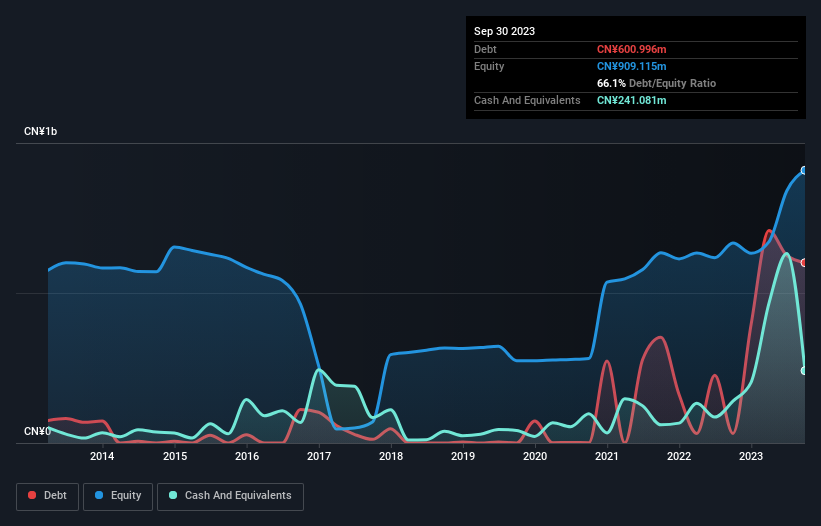- China
- /
- Real Estate
- /
- SHSE:600696
These 4 Measures Indicate That Shanghai GuijiuLtd (SHSE:600696) Is Using Debt Reasonably Well
Warren Buffett famously said, 'Volatility is far from synonymous with risk.' So it seems the smart money knows that debt - which is usually involved in bankruptcies - is a very important factor, when you assess how risky a company is. We note that Shanghai Guijiu Co.,Ltd (SHSE:600696) does have debt on its balance sheet. But should shareholders be worried about its use of debt?
What Risk Does Debt Bring?
Debt assists a business until the business has trouble paying it off, either with new capital or with free cash flow. In the worst case scenario, a company can go bankrupt if it cannot pay its creditors. However, a more common (but still painful) scenario is that it has to raise new equity capital at a low price, thus permanently diluting shareholders. By replacing dilution, though, debt can be an extremely good tool for businesses that need capital to invest in growth at high rates of return. The first thing to do when considering how much debt a business uses is to look at its cash and debt together.
View our latest analysis for Shanghai GuijiuLtd
How Much Debt Does Shanghai GuijiuLtd Carry?
As you can see below, at the end of September 2023, Shanghai GuijiuLtd had CN¥601.0m of debt, up from CN¥32.0m a year ago. Click the image for more detail. On the flip side, it has CN¥241.1m in cash leading to net debt of about CN¥359.9m.

How Healthy Is Shanghai GuijiuLtd's Balance Sheet?
We can see from the most recent balance sheet that Shanghai GuijiuLtd had liabilities of CN¥1.26b falling due within a year, and liabilities of CN¥28.2m due beyond that. Offsetting these obligations, it had cash of CN¥241.1m as well as receivables valued at CN¥23.1m due within 12 months. So its liabilities total CN¥1.02b more than the combination of its cash and short-term receivables.
While this might seem like a lot, it is not so bad since Shanghai GuijiuLtd has a market capitalization of CN¥4.31b, and so it could probably strengthen its balance sheet by raising capital if it needed to. But it's clear that we should definitely closely examine whether it can manage its debt without dilution.
We measure a company's debt load relative to its earnings power by looking at its net debt divided by its earnings before interest, tax, depreciation, and amortization (EBITDA) and by calculating how easily its earnings before interest and tax (EBIT) cover its interest expense (interest cover). This way, we consider both the absolute quantum of the debt, as well as the interest rates paid on it.
Shanghai GuijiuLtd's net debt is only 1.4 times its EBITDA. And its EBIT easily covers its interest expense, being 14.0 times the size. So you could argue it is no more threatened by its debt than an elephant is by a mouse. Better yet, Shanghai GuijiuLtd grew its EBIT by 211% last year, which is an impressive improvement. That boost will make it even easier to pay down debt going forward. There's no doubt that we learn most about debt from the balance sheet. But it is Shanghai GuijiuLtd's earnings that will influence how the balance sheet holds up in the future. So if you're keen to discover more about its earnings, it might be worth checking out this graph of its long term earnings trend.
Finally, while the tax-man may adore accounting profits, lenders only accept cold hard cash. So we clearly need to look at whether that EBIT is leading to corresponding free cash flow. During the last three years, Shanghai GuijiuLtd burned a lot of cash. While investors are no doubt expecting a reversal of that situation in due course, it clearly does mean its use of debt is more risky.
Our View
Shanghai GuijiuLtd's conversion of EBIT to free cash flow was a real negative on this analysis, although the other factors we considered were considerably better. In particular, we are dazzled with its interest cover. When we consider all the elements mentioned above, it seems to us that Shanghai GuijiuLtd is managing its debt quite well. But a word of caution: we think debt levels are high enough to justify ongoing monitoring. The balance sheet is clearly the area to focus on when you are analysing debt. But ultimately, every company can contain risks that exist outside of the balance sheet. For instance, we've identified 1 warning sign for Shanghai GuijiuLtd that you should be aware of.
When all is said and done, sometimes its easier to focus on companies that don't even need debt. Readers can access a list of growth stocks with zero net debt 100% free, right now.
New: Manage All Your Stock Portfolios in One Place
We've created the ultimate portfolio companion for stock investors, and it's free.
• Connect an unlimited number of Portfolios and see your total in one currency
• Be alerted to new Warning Signs or Risks via email or mobile
• Track the Fair Value of your stocks
Have feedback on this article? Concerned about the content? Get in touch with us directly. Alternatively, email editorial-team (at) simplywallst.com.
This article by Simply Wall St is general in nature. We provide commentary based on historical data and analyst forecasts only using an unbiased methodology and our articles are not intended to be financial advice. It does not constitute a recommendation to buy or sell any stock, and does not take account of your objectives, or your financial situation. We aim to bring you long-term focused analysis driven by fundamental data. Note that our analysis may not factor in the latest price-sensitive company announcements or qualitative material. Simply Wall St has no position in any stocks mentioned.
About SHSE:600696
Mediocre balance sheet with minimal risk.
Market Insights
Community Narratives



